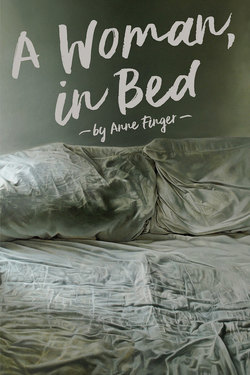Читать книгу A Woman, In Bed - Anne Finger - Страница 23
На сайте Литреса книга снята с продажи.
ОглавлениеBack
“He isn’t coming back,” Simone’s mother said.
“I don’t know what you are talking about.”
“You know very well who I am talking about. Albert’s friend. You can sit there gazing down the road forever.”
“I’m not gazing down the road. I’ve got to look somewhere.” She turned her head and stared at the grove of olive trees on the hillside.
“You used to moon after your father in just the same way.” Her mother snapped the tablecloth as she shook the crumbs into the yard.
In the distance, the occasional dark splotch resolved itself into a wandering cow or M. duPont on his bicycle, bringing nothing more than a letter from Luc, or disappeared before it could be made out.
And then, one day, M. duPont waved, thumb and forefinger extended, to indicate he had two letters.
She opened the one from Albert before the one from Luc, skimmed through the letter greedily: Carcassonne was a marvel, we truly felt as if we weren’t in this century, or even the last…We had our dreams of returning to you, and if our purses and our circumstances had permitted we would have, but alas when we left Carcassonne we were penniless. Her eyes raced through the letter, searching again for the letter “J.” Joë refuses to have electric lights, he says the electricity jangles his damaged nerves…And then, at the end of the letter, in the very last paragraph, there it was again, the letter “J,” the curved triangle with the fish hook hanging from it, and the letter that followed was not a single “e,” the letters that followed were not “oë,” the letters that followed were “acques,” the word was “Jacques,” and the sentence as a whole read, “Jacques seems to have taken quite a shine to you, and requests permission to write to you.”
She didn’t care who saw her running up the path, racing up the stairs—not her mother or the lodgers who might later say My, it seemed as if the hounds of hell were after you and then lift an eyebrow, waiting for an explanation. Not Cecile, who would ensure that this tidbit of information got passed all over town: I don’t know what was going on, I just know that when M. DuPont came back, she was down at the end of the road, waiting for him with a letter, hailing him as if he were a taxicab. Simone didn’t even care that the letter she had written to Albert was so hastily scrawled her pen tore the paper, and her words were a quick jumble, telegraphic: Glad to hear that you are well. The baby and I are both fine. Tell Jacques that yes, he may write to me. I hope you will write to me, too. I will write you a longer letter soon. And then, because the letter seemed altogether too abrupt: The baby tires me out and I want to make the next post. I embrace you tenderly, Simone.
A month elapsed before the letter from Jacques arrived. Thank you for giving me permission to write to you. I hesitated only because I did not want to cause any difficulty between you and your relations—whether by blood or marriage. It has taken me so long to pen this missive that I fear by now you may have returned to Istanbul. I have been much involved in affairs here at home in Paris—the completion of a manuscript about my sojourn in Madagascar, for which my publisher is quite eager, and, also, if I can speak quite frankly, in difficulties in my household, which, alas, is not a happy one. My wife is pregnant again.
Simone read the letter over and over again: there was no reference to their—to what had transpired between the two of them—but then, again, Simone was quite uncertain how one would refer to—sexual congress—she had no other words save those. She felt a bit like a child trying to follow a discussion at the family dinner table, knowing that the arched eyebrows, the forced coughs, the allusive words were codes she could not decipher. Was this letter endeavoring to create greater intimacy between the two of them? Or was it merely an attempt to, as the saying went, “let her down easy”? She wrote back to him, having gone through numerous drafts, trying to match her tone to his. In one version she wrote, I am sorry to hear that your home life is difficult, but then thought that sounded too remote. In another draft, written late at night, she made explicit reference to their lovemaking, but when she read it over in the morning she was so ashamed she ripped the paper into tiny squares. In the end, her letter contained reports of the local weather and listings of her son’s latest doings, with a scrawled P.S. I am somewhat cowed, writing to a literary man like you, I fear I don’t express myself at all well, I do miss you, and underlined the word “do.”
